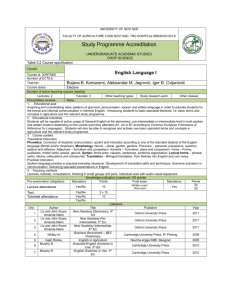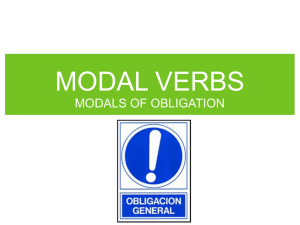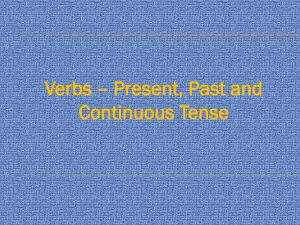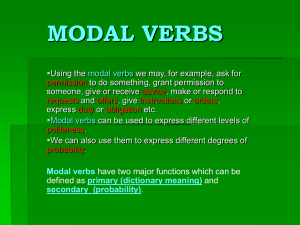IA902 Practical Description of English : Session 5 The English Verb
advertisement
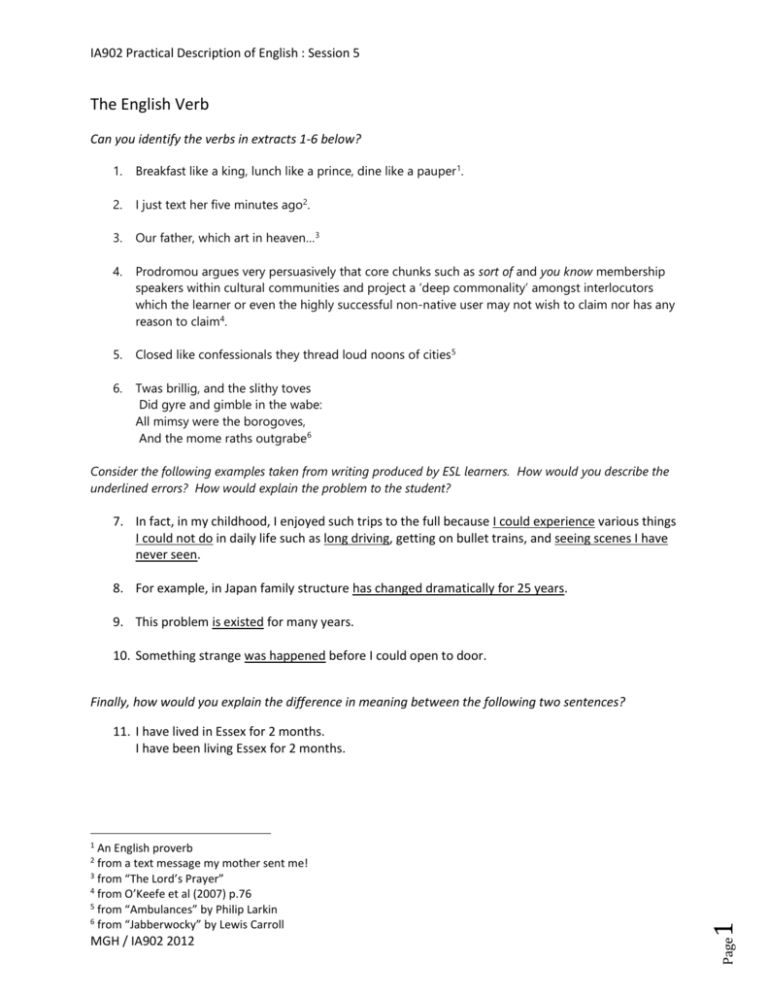
IA902 Practical Description of English : Session 5 The English Verb Can you identify the verbs in extracts 1-6 below? 1. Breakfast like a king, lunch like a prince, dine like a pauper 1. 2. I just text her five minutes ago2. 3. Our father, which art in heaven…3 4. Prodromou argues very persuasively that core chunks such as sort of and you know membership speakers within cultural communities and project a ‘deep commonality’ amongst interlocutors which the learner or even the highly successful non-native user may not wish to claim nor has any reason to claim4. 5. Closed like confessionals they thread loud noons of cities 5 6. Twas brillig, and the slithy toves Did gyre and gimble in the wabe: All mimsy were the borogoves, And the mome raths outgrabe6 Consider the following examples taken from writing produced by ESL learners. How would you describe the underlined errors? How would explain the problem to the student? 7. In fact, in my childhood, I enjoyed such trips to the full because I could experience various things I could not do in daily life such as long driving, getting on bullet trains, and seeing scenes I have never seen. 8. For example, in Japan family structure has changed dramatically for 25 years. 9. This problem is existed for many years. 10. Something strange was happened before I could open to door. Finally, how would you explain the difference in meaning between the following two sentences? 11. I have lived in Essex for 2 months. I have been living Essex for 2 months. 1 An English proverb from a text message my mother sent me! 3 from “The Lord’s Prayer” 4 from O’Keefe et al (2007) p.76 5 from “Ambulances” by Philip Larkin 6 from “Jabberwocky” by Lewis Carroll Page MGH / IA902 2012 1 2 IA902 Practical Description of English : Session 5 Tense and Aspect Are the following statements TRUE or FALSE? 1. There are only two tenses in English. 2. “Present continuous” is not the name of a tense. 3. In English, there is no relationship between time and tense. In relation to statements 1 and 3, consider the following: a) b) c) d) e) Melody makes the best soup in the world. Term ends on the 14th of December. Christie’s train leaves at 4.30. Would you mind if I opened the window? Have you been beyond the fifth floor in the paternoster lift? Definitions of TENSE: Briefly, tense is the representation in grammar of the distinction that we make between past, present and future in our view of time. In English we encode the distinction between present and past tense in different forms of verbs. (Jackson, 1990) To the linguist tense is a technical term. It means that there is a morphological change in the base form of the verb. A verb form which is made with an auxiliary is not, in this technical meaning, a “tense”. (Lewis, 1986) Definitions of ASPECT: Aspect, typically, expresses whether actions or events are finished or unfinished, temporary or protracted. (Parrot, 2010) Page MGH / IA902 2012 2 Aspect indicates the speaker’s perspective on time as indicated in a verb phrase, particularly whether an action is treated as finished or is still in progress or still relevant to the moment of speaking. English has two aspects: perfect and progressive (sometimes known as continuous). (Carter and McCarthy, 2006) IA902 Practical Description of English : Session 5 Time-line drawings (Thornbury, 1997) How would you physically depict the tense and aspect combinations in the sentences below? MGH / IA902 2012 10. 11. 12. 13. 14. 15. 16. 17. 18. I swear it wasn’t me. I’ve seen him already. I’m going to see him tomorrow. I saw him yesterday. I’d seen him before. I was going to see him in the afternoon. I’ll see him tomorrow. I’ll have seen him before Saturday. I’ll be going to see him when I get to London. 3 It’s raining. It was raining. I propose a toast. I live in Oxford. Wood floats on water. I play tennis most weekends. I’m taking the car every day this week. I lived in Cambridge for 4 years. I was living in Cambridge for 4 years. Page 1. 2. 3. 4. 5. 6. 7. 8. 9. IA902 Practical Description of English : Session 5 Lexical Aspect / Semantic Classes of Verbs STATES Quality Colchester is a quiet town. Spiders have eight legs. This soup tastes of garlic. Temporary state She was silent when I asked her to marry me. I had confidence in my ability until this exercise began. Stance Who is sitting next to Korina? We all live in Essex. Private state: Intellectual I know that you are bored. I think this is too easy. Emotion / attitude I don’t like The Spice Girls. I sympathise with you. I love McDonalds. Perception Can you hear someone snoring? I can taste garlic in the soup. I’ve never seen anything so beautiful. Can you smell gas? Bodily sensation My head hurts. I ache all over. It hurts me to laugh. adapted from Jackson (1990) But what about the following? MGH / IA902 2012 4 Can you taste this soup for me? Is it too salty? Look at that cloud! Why doesn’t anybody listen to me? I’m loving it This exercise began slowly. Page 1. 2. 3. 4. 5. IA902 Practical Description of English : Session 5 NON-STATE EVENTS ACTIONS “Events refer to things that happen. There is no stated human or other animate instigator or agent for an event: they simply occur”. “Actions do not just happen. Actions are usually performed by human, or at least animate, agents or instigators. They are normally the result of the exercise of a will or intention on the part of the agent” Goings-on Activity Process Accomplishment Momentary event Momentary act Transitional event Transitional act How might you classify each of the following sentences using the terms above? a) Buses don’t usually run on time in the UK. i) Kumiko began her essay in October. b) The steering wheel hit his chest. j) Yifan has already finished her essay. c) My phone isn’t working. k) A bomb exploded in the town centre. d) Wakana kicked the poor innocent kitten. l) e) Surprisingly, the bus arrived on time. m) Students are protesting again. f) n) Mark is making dinner for his lovely wife British food. h) Cissy sings like a female Frank Sinatra. MGH / IA902 2012 tonight. o) Zoe grabbed the money and ran. p) The price of petrol has increased again. 5 g) Evangelia has discovered the truth about Page The weather improved. The days are getting shorter. IA902 Practical Description of English : Session 5 EVENTS DURATIVE PUNCTUAL NON-CONCLUSIVE goings-on momentary event CONCLUSIVE process transitional event DURATIVE PUNCTUAL NON-CONCLUSIVE activity momentary act CONCLUSIVE accomplishment transitional act ACTIONS Explain why the statements in the right-hand column are strange: The bus is arriving *The bus is arrived. The bus has arrived *The bus has been arriving. I’ve cut my finger. I’ve been cutting my finger. Can this help us to explain any of the problems we’ve noted previously? a) I’ve lived in Colchester for 2 years. I’ve been living in Colchester for 2 years. b) They’ve painted their house. They’ve been painting their house. Should the distinctions be the same? Compare: MGH / IA902 2012 6 Norman has written only one novel since 1998. Norman has owned only one car since 1998. Page IA902 Practical Description of English : Session 5 Yule’s Breakdown of Lexical Aspect STATIVE DYNAMIC PUNCTUAL DURATIVE Cognition Relations Acts Activities believe hate know like understand want be belong contain have own resemble hit jump kick stab strike throw eat run swim walk work write Processes become change flow grow harden learn From Yule (1998 : 64) Lexical and Grammatical Aspect LEXICAL ASPECT stative or dynamic punctual or durative GRAMMATICAL ASPECT progressive : viewed from the inside, in progress perfect : view from the outside, in retrospect Lexical aspect Implicated meaning perfect + dynamic = completed activity, retrospectively viewed perfect + stative = pre-existing state, retrospectively viewed progressive + dynamic = ongoing activity, internally viewed progressive + stative = temporary state, internally viewed From Yule (1998 : 67) MGH / IA902 2012 Page Grammatical aspect 7 Combining lexical and grammatical aspect IA902 Practical Description of English : Session 5 Modal Verbs There is no doubt that the overall picture of the modals is extremely “messy” and untidy and that the most the linguist can do is to impose some order, point some regularities, correspondences, parallelisms…This subject is not one that lends itself to any simple explanation. (Palmer, 1979.cited in Lewis, 1986, p.99) Is this true of your experience, either as a teacher or as a learner (or both)? Can you give examples of any difficulties you have experienced? Definitions Modal verbs belong to the larger category of auxiliary verbs, i.e. we don’t use them on their own; we have to use them in conjunction with another (main) verb. They are thus sometimes also called ‘modal auxiliaries’. (Parrot, 2010) Modality refers to a speaker’s or a writer’s attitude towards, or point of view about, a state of the world. It is centrally concerned with the expression of certainty, volition, possibility and obligation. Core modal verbs (can, could, may, might, will, shall, would, should, must) and semi-modals (dare, need, ought to, used to) are the principal way in which modal meanings are expressed. (Carter and McCarthy, 2006) Types of modals? Pure modals can could may might must shall should will would Marginal modals dare need ought to Semimodals be going to be supposed to had better had best have got to have to (Cowan, 2008, p.295) Page MGH / IA902 2012 8 Do you find these categories useful? IA902 Practical Description of English : Session 5 3 Perspectives on modals Cowan (2008): - Responsible for the categories on the previous page. Identifies 27 different functions for the pure modals alone! Jackson (1990): - Divides all modal verbs into categories of NECESSSITY and POSSIBILITY. Within the category of POSSIBILITY, ability, permission, and volition are subcategories that apply when an “agentive participant” is referred to Lewis (1986): - - can, could, may, might, shall, should, will, would, must – revealing as a “closed group” (not abnormalities). A parallel with a closed group such as pronouns is considered relevant. Omission from this list of HAVE TO and OUGHT TO is significant. For Lewis, the reasons why they are not modal verbs is illuminating “Essentially grounded in the moment of speaking – based on an assessment ‘in the present circumstances’” Express the speaker’s judgement about the non-factual, non-temporal elements in an action. Does any of this help us to explain: a) The difference between “must” and “have to”? b) The difference between “You didn’t need to” and “You needn’t have”? c) Why “would” can have the same meaning as “used to” (but not always)? Page MGH / IA902 2012 9 d) Why “I could swim when I was five” and “I was able to swim when I was five” have the same meaning, but “I was able to finish my essay before the deadline” and “I could finish my essay before the deadline” have different meanings? IA902 Practical Description of English : Session 5 References and further reading Biber, D. et al. 1999 Longman Grammar of Spoken and Written English, Longman Biber, D. et al. 2002 Longman Student Grammar of Spoken and Written English, Longman Carter, R. and McCarthy, M. 2006 Cambridge Grammar of English, Cambridge University Press Cowan, R. 2008 The Teacher’s Grammar of English, Cambridge University Press Culpeper, J. et al (eds) 2009 English Language: Description, Variation and Context. Palgrave Macmillan Jackson, H. 1990 Grammar and Meaning : A Semantic Approach to English Grammar, Longman Larsen-Freeman, D. 2003 Teaching Language : From Grammar to Grammaring, Heinle Lewis, M. 1986 The English Verb, Thomson Heinle Odlin, T. (ed) 1994 Perspectives on Pedagogical Grammar, Cambridge University Press O’Keefe, A. et al. 2007, From Corpus to Classroom, Cambridge University Press Parrot, M. 2010 Grammar for English Language Teachers (2nd edn) Cambridge University Press Thornbury, S. 1997 About Language, Cambridge University Press Willis, D. 2003 Rules, Patterns and Words, Cambridge University Press Page MGH / IA902 2012 10 Yule, G. 1998 Explaining English Grammar, Oxford University Press IA902 Practical Description of English : Session 5 Appendix 1 : Frequency 11 MGH / IA902 2012 from Biber et al (2002), pp.105-110 Page Some introductory tasks IA902 Practical Description of English : Session 5 Appendix 2: ‘Grammatical behaviour’ of subdivisions of verbs Perfect? Progressive Passive? Colchester has been a quiet town. *This soup is tasting of garlic. *Eight legs are had by spiders She has been silent since I proposed. *I was having confidence in my ability. *Confidence was had by me. Who has sat next to Korina? We are all living in Essex. *Essex is lived in by us. *I have thought that this is too easy. *I am knowing that you are bored. It is thought… I don’t like The Spice Girls. I sympathise with you. I love McDonalds. Can you hear someone snoring? I can taste garlic in the soup. Can you smell gas? I have always sympathised with you. *I am not liking The Spice Girls. The Spice Girls are not liked by all of us. I’ve never seen anything so beautiful. *Are you smelling gas? Garlic can be tasted in the soup. My head hurts. I ache all over. It hurts me to laugh! *I have ached all over. My head is hurting. *be ached Quality Colchester is a quiet town. Spiders have eight legs. This soup tastes of garlic. Temporary state She was silent when I asked her to marry me. I had confidence in my ability until this exercise began. Stance Who is sitting next to Korina? We all live in Essex. Private Intellectual I know that you state: are bored. I think this is too easy. Emotion / attitude Perception Bodily sensation MGH / IA902 2012 It is known… 12 Example Page SUBCLASS OF STATE IA902 Practical Description of English : Session 5 APPENDIX 3 : EXAMPLES OF EVENTS AND ACTIONS KEY EVENTS: “Events refer to things that happen. There is no stated human or other animate instigator or agent for an event: they simply occur”. ACTIONS: “Actions do not just happen. Actions are usually performed by human, or at least animate, agents or instigators. They are normally the result of the exercise of a will or intention on the part of the agent” Goings-on Buses don’t usually run on time in the UK. My phone isn’t working. Activity Cissy sings like a female Frank Sinatra. Students are protesting again. Process The weather improved. The days are getting shorter. Accomplishment Evangelia has discovered the truth about British food. Mark is making dinner for his lovely wife tonight. Momentary event The steering wheel hit his chest. A bomb exploded in the town centre. Momentary act Wakana kicked the poor innocent kitten. Zoe grabbed the money and ran. Transitional event Surprisingly, the bus arrived on time. The price of petrol has increased again. Transitional act Kumiko began her essay in October. Yifan has already finished her essay. Page MGH / IA902 2012 13 (Jackson, 1990)




